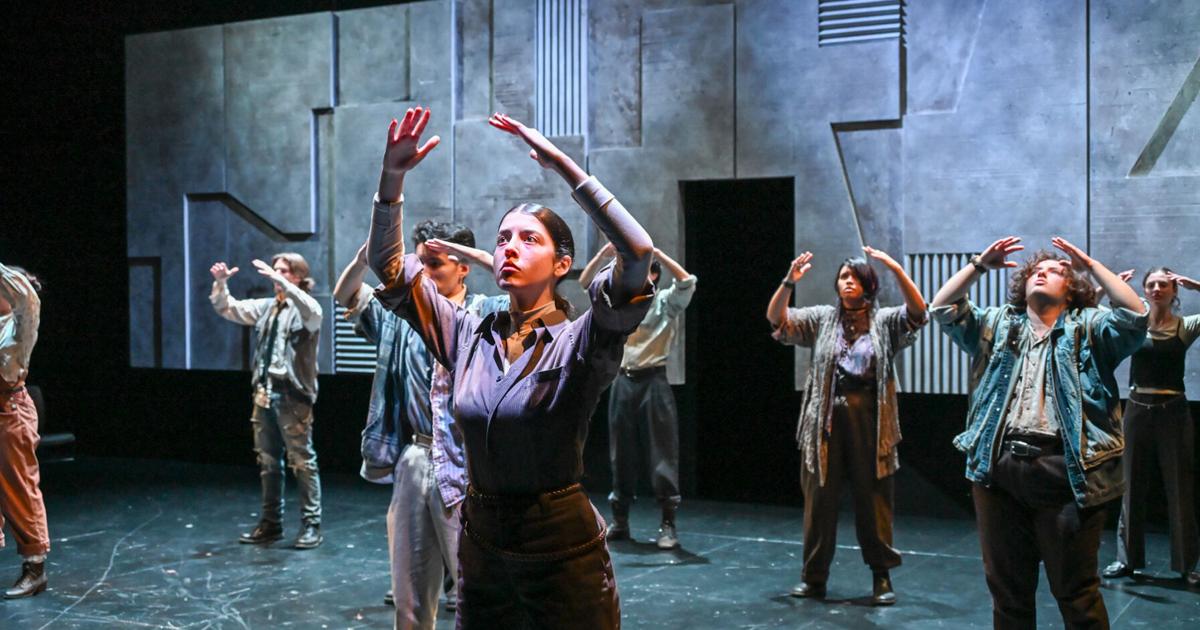Teenagers should be allowed to impose the death penalty.
That might sound outrageous, but let’s be honest — you probably once agreed.
That’s the scary thesis of Dawn King’s play “The Trials,” which ran for five electric performances at Zellerbach Hall last week in an all-around excellent production by UC Berkeley’s Department of Theatre, Dance and Performance Studies.
Following a horrible climate disaster, society has rebuilt itself upon a system of retributive justice: Anyone over the age of 18 whose carbon emissions have exceeded a set allotment is tried before a jury of 12 randomly selected teenagers. As members of the generation most affected by climate crimes, these teens are tasked with deciding whether the accused will live or die.
Over the course of the play, three adults are brought to trial. Each “dino” — that’s what the kids call polluters and creatures of the past, such the Sinclair Oil Corporation’s brontosaurus — gets the chance to deliver a brief speech in their own defense. There’s a timer, of course. Anyone who talks for too long is punished with a painful, overengineered buzz, thanks to excellent sound design by Michael Kelly.
“The courts have to be fast,” Gabi (Jackie Campion) declares. “It saves time and resources.”
These kids mean business. In director Daniel Larlham’s punchy staging, they cluster together en masse whenever an adult is present, seemingly melding into one creature — a huge, many-headed teen divinity. Seated in a row upstage, they eyeball the first defendant (Mark Rafael Truitt) as he trudges into the spotlight wearing an orange onesie — or a prison jumpsuit, for that matter. The defendant explains that he simply had to take all those flights for work: He needs a salary to support his three kids.
“Who needs three kids?” shouts Noah (Jack William Reid) in the deliberation session that follows. Everyone knows that children eat mightily into the carbon quota.
Meanwhile, Mohammad (Diego Staben) insists on the defendant’s innocence with the sort of preppy confidence which, in adult life, wins elections and ends marriages, but can only lead to violence in a room full of teenagers. Later, Mohammad and Noah hit the floor in a full-on wrestling match, courtesy of fight director Dave Maier. The pair demonstrates that age-old male bonding ritual of trying to snuggle an enemy to death.
Bernard Timmons II is superb as slacker bro Tomaz, treating the whole situation as a comedy sketch in which he’s the star. Only when he turns from his peers to face the audience does his expression register the full horror of the situation. Other standouts include Campion as Gabi, who embodies the energy of that one annoying political science major, and Amadora Paola as Zoe, who does everything with a vengeance, especially flirting. Ren, eventually revealed as the piece’s tragic hero, is played with dignity by Alexandra Perez.
Dominique Fawn Hill’s costumes, which run the gamut from gray rags to full business casual, make sense for a teen trying to express personal style with clothes salvaged from trash heaps. Yes, it’s pathetic. Yes, viewers are meant to feel bad.
But audiences are also meant to ask: Who summoned these kids here in the first place? The icky reality of the situation — that climate-righteous adults are using teenagers to perform a moral calculus that even they themselves would rather avoid — comes in loud and clear. “Don’t make me choose!” cries idealistic Amelia (Wanchen Li) in a climactic scene: She thinks the defendant is guilty, of course, but she’d hate to cast the deciding vote.
God, young adults are chaotic. Imagine how many teenagers would execute our parents if we thought it was the right thing to do.

